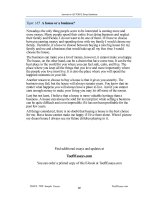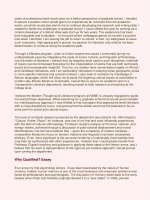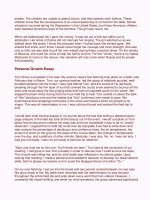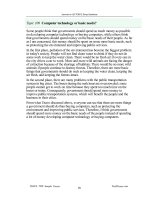Answers to all toefl essay question part 52
Bạn đang xem bản rút gọn của tài liệu. Xem và tải ngay bản đầy đủ của tài liệu tại đây (36.75 KB, 8 trang )
streets. The children are unable to attend school, and their parents work fulltime. These
children know that the consequence of an unsuccessful day is no food for the table. Similar
situations occurred during the Depression in the United States, but those American children
were faceless shoeshine boys of the twenties. This girl was real to me.
When we walked past her I gave her money. It was not out of pity but rather out of
admiration. Her smile of thanks did not interrupt her singing. The girl watched us as we
walked down the street. I know this because when I looked back she smiled again. We
shared that smile, and I knew I would never forget her courage and inner strength. She was
only a child, yet was able to pull her own weight during these uncertain times. On the streets
of Moscow, she used her voice to help her family survive. For this "Annie," there is no Daddy
Warbucks to come to the rescue. Her salvation will only come when Russia and its people
find prosperity.
Personal Growth Essay
Tom Zincer succeeded in his task. My science class's first field trip took place on a bitter cold
February day in Maine. Tom, our science teacher, led the group of relatively puzzled, well-
bundled students into the forest. I was right behind Tom, and the sound of his red boots
breaking through the thin layer of ice that covered the crusty snow seemed to bounce off the
trees and scare away the few singing birds that had not migrated south for the winter. We
stopped fourteen times during that four-hour field trip to hear Tom ramble on about the bark
of "this" deciduous tree and the habitat that "this" coniferous tree needs to grow. We
examined animal droppings and tracks in the snow and traced a bird's song back to its
singer. This was all meaningless to me. I was cold and bored and wanted the field trip to
end.
I would later write several essays in my journal about the fact that writing a detailed seven-
page analysis of the field trip took all the beauty out of the event. I would complain to Tom
about how boring and mundane his class was and how impossible it was to be so "anally"
observant. I argued that no field trip could ever be enjoyable if we had to write down and
later analyze the percentage of deciduous and coniferous trees, the air temperature, the
amount of snow on the ground, the slope of the course taken, the change in temperature
over the day, and a plethora of other minutia. Basically, I was lazy. No, no. I was not lazy. I
was just not ready; I was not yet ready to become an observer.
"Sam, just trust me on this one. You'll thank me later," Tom said at the conclusion of our
meeting. I had gone to see Tom privately in order to discuss how I could survive his class.
The minutia was killing me, and my slow death was reflected in my dismal grade. Upon
leaving that meeting, I made a personal and academic decision to develop my observational
skills, both to please my teacher and to avoid the disappointment of another "D+."
On my next field trip, I set out into the forest with two pencils cocked between my two ears
like guns ready to fire. My teeth were clenched with the determination to stay focused
throughout the entire field trip and write down every word that man uttered. However, I
constantly felt myself drifting, and while my mind wandered, the group advanced significantly
ahead of me, and I missed the sighting of another bird. I ran up to the group just in time to
hear Tom start his lecture about a nearby rock formation. Instead of listening, I was asking
my friend to see his Picasso-like rendition of the bird. I, therefore, fell behind on the lecture,
and so went the endless cycle: fall behind, try to catch up, fall more behind. When it came
time to rewrite my field notes in legible form, I stared at a piece of paper that consisted of
smudged squiggly lines and eventually tears. Frustrated and disappointed, I retreated back
to my cabin to seek refuge.
I quickly got undressed and slipped under my blanket for warmth, comfort, and most
importantly protection. After I gave myself a few minutes to calm down, I took out the wet
crumbled piece of paper from my pocket and tried to redraw a stick figure of a bird. The
twelve stick figures, representing the twelve different birds we saw, looked exactly the same,
and trying to redraw each body part of each bird to scale was so difficult that I felt like each
pen stroke was met with a ton of resistance. Giving up, I pushed the piece of paper back into
my pocket and lay down on my back. I saw Simon sitting in his characteristically feminine
position on Ethan's bed. Simon was sitting, facing Ethan, with his legs crossed and his right
hand casually nestled on his right kneecap, his foot twitching like the tail of a happy dog.
Ethan was lying on his side with his big black headphones cupped around his ears, reading
Faulkner. As my head swiveled, I noticed Conrad, sleeping, as usual, with his blanket
clenched tightly under his chin, with both fists. I heard Fred and Rob discussing the pitfalls of
modern education and could see Donald's head rhythmically moving back and forth, in sync
with Jimi Hendrix. I then realized that I too was part of my environment. I realized that I was a
silent participant, and more importantly, I realized that I was an observer.
On my next field trip, I had one pencil nonchalantly nestled on top of my right ear. I set out
with no mission in mind and had no vengeance in my heart. I intentionally lagged behind my
fellow classmates in order to get a wider, broader perspective of the environment. Applying
what I learned in my cabin, I was able to engage all of my senses and could attempt to take
in the vastness of it all. When we returned from our field trip, the task of doing a "rewrite" did
not seem so odious, and my pencil flew across the page like a writer who just experienced
an epiphany and wants to get his idea down before he forgets it. I drew every bird, tree, and
rock as best I could, and although they were not perfect, they were exactly what I saw.
Hobbies and Interests Essay
The sun is still asleep while the empty city streets await the morning rush hour. As in a ritual,
my teammates and I assemble into the dank, dimly-lit locker room at the Rinconada Park
Pool. One by one, we slip into our moist drag suits and then make a mad run from the locker
room through the brisk morning air to the pool, stopping only to grab a pull-buoy and a kick-
board. Coastal California cools down overnight to the high forties. The pool is artificially
warmed to seventy-nine degrees, and the clash in temperatures creates a plethora of steam
on the water's surface, casting a scene more appropriate for a werewolf movie. Now the
worst part: diving head-first into the glacial pond. I think of friends still tucked in their warm
beds as I conclude the first warm-up laps. Meanwhile, our coach emerges through the fog.
He offers no friendly accolades, just a stream of instructions and exhortations.
Thus begins another workout. 4,500 yards to go, then a quick shower and five-minute drive
to school. Another 5,500 yards are on our afternoon training schedule. Tomorrow, the cycle
starts all over again. The objective is to cut our times by another 1/10th of second. The end
goal is to have that tiny difference at the end of a race that separates success from failure,
greatness from mediocrity. Somehow we accept the pitch--otherwise, we'd still be fast asleep
beneath our blankets. Yet sleep is lost time, and in this sport time is the antagonist. Coaches
spend hours in specialized clinics, analyzing the latest research on training techniques and
experimenting with workout schedules in an attempt to unravel the secrets of defeating time.
My first swimming race was when I was ten years old and an avid hockey player. My
parents, fearing that I would get injured, redirected my athletic direction toward swimming.
Three weeks into my new swimming endeavor, I somehow persuaded my coach to let me
enter the annual age group meet. To his surprise and mine, I pulled out an "A" time. National
"Top 16" awards through the various age groups, club records, and finally being named a
National First Team All-American in the 100 Butterfly and Second Team All-American in the
200-Medley Relay cemented an achievement in the sport. Reaching the Senior
Championship meet series means the competition includes world-class swimmers. Making
finals will not be easy from here: these 'successes' were only separated from failure by
tenths of a second. And the fine line between total commitment and tolerance continues to
produce friction. Each new level requires more weight training, longer weekend training
sessions, and more travel. Time that would normally be spent with friends is increasingly
spent in pursuit of the next swimming objective.
In the solitude of the laps, my thoughts wander to events of greater significance. This year,
my grandmother was hit with a recurrence of cancer, this time in her lungs. A person driven
by good spirits and independence now faces a definite timeline. On the other side of the
Pacific Ocean, my grandfather in Japan also contracted the disease. His situation has been
corrected with surgery--for now, anyway. In the quest to extend their lives, they have both
exhibited a strength that surpasses the struggles I confront both in sports and in life. Our
different goals cannot be compared, yet my swimming achievements somehow provide a
vicarious sense of victory to them. When I share my latest award or partake with them a
story of a triumph, they smile with pride as if they themselves had stood on the award stand.
I have the impression that my medals mean more to them than I will ever understand.
Life's successes appear to come in small increments, sometimes mere tenths of a second. A
newly learned skill, a little extra effort put on top of fanatical training routine, a good race day,
or just showing up to a workout when your body and psyche say "no" may separate a great
result from a failure. What lies in between is compromise, the willpower to overcome the
natural disposition to remain the same. I know that my commitment to swimming carries on
to other aspects of life, and I feel that these will give me the strength to deal with very
different types of challenges.
Hire an Harvard-educated editor to correct your application essay!
Special Discount Coupon
Use coupon code 353353 for $7.50 off EssayEdge.com's
critically acclaimed admissions essay editing services. Enter the coupon code on the order
form when placing your order.
Content provided by EssayEdge.com
Put Harvard-Educated Editors to Work for You!
Business School Admissions Essay Samples
Why MBA? Essay
Turkish news nowadays carry vivid images which have become terrifyingly commonplace:
the surface of the sea littered with dead sheep; a landfill explosion leading to a number of
deaths; vendors offering radiation-contaminated tea for half-price; a little girl's death resulting
from her fall through an open sewage manhole in her schoolyard; radioactive waste sold to
unsuspecting scrap dealers; a twenty-year-old tanker breaking into pieces, spilling hundreds
of tons of crude oil into the ocean and killing sea life all around.
The frequency with which these environmental disasters fill Turkish news broadcasts -- along
with the obvious insensitivity of the authorities towards both environment and health issues --
prompted me to learn about ways to prevent these types of disasters. At the age of fifteen, I
decided to focus my studies on environmental sciences in order to equip myself with the
technical tools I would need to make a real contribution.
After earning a master's degree in environmental sciences, I completed a professional
international management certificate program in order to gain a management perspective of
the field. I then realized that, in order to effectively combine my technical knowledge and
management skills, I needed to accumulate real-world experience. Specifically, working at a
large company would allow me to develop insight into various industries, as well as an
overarching vision of the international business arena.
I have now worked for nearly two years in the energy and environment group of Koc Holding,
Turkey's first and biggest diversified conglomerate. As a project engineer, I am mainly
responsible for our holding companies' environment and energy sector investments. This
position has given me the opportunity to interact with businessmen from all over the world,
thereby expanding my international perspective. Because of my outstanding work
performance, I was chosen to attend various meetings with local and international
governmental bodies such as OPIC, IFC, and the World Bank. It is highly unusual for a
young associate to represent the company at such events, and my self-confidence -- as well
as my management skills -- was further enhanced by that successful experience.
While working in various business lines, including the automotive industry, consumer
durables, and the energy sector, I have realized that the root cause of many environmental
problems is financial. I believe that many people in the environmental sector are so ignorant
or insensitive that they will cheat customers to increase profits. Furthermore, businesses do
not prioritize environmental investments; as a result, insufficient funds are allocated to
adequately prevent problems. For instance, despite a population over eight million people,
Istanbul, Turkey's largest city, still lacks a properly operating sewage system. In most of the
areas of the city, waste water is discharged directly into the Bosphorus.
In the long term, I hope to help solve my country's problems by starting my own
environmental-services business in Turkey. The company will serve both local and
international customers by providing cost-effective, adaptable solutions ranging from waste
management to safety management. In order to accomplish this goal, however, I must
deepen my knowledge of the field. Despite my experience, I still lack some important
knowledge and management skills, especially in finance, marketing, and entrepreneurship. I
am also aware that my knowledge of American environmental issues is insufficient. Since
dealing with aspects of international business will be an integral part of my job as an
entrepreneur, it is essential that I fill in these gaps.
The NAME School's MBA program is the perfect bridge from where I am to where I want to
be. I am attracted by the inventiveness and uniqueness of its entrepreneurial and finance
programs, and believe that I will increase my practical knowledge of entrepreneurship by
interacting with my classmates. I value the fact that at NAME entrepreneurial education does
not stop at the classroom, but rather continues through internships and extracurricular
activities. I feel that a business school for entrepreneurs should balance a dose of theory
with real-world application, and NAME's curriculum and hands-on experiences through
associations, internships, and the management field study provide such balance.
I am also drawn to NAME because of the school's emphasis on teamwork and technology,
reflected by such exciting courses and programs as High Technology Entrepreneurship,
International Finance, 12-week field application projects, and the global immersion program
directed to teach global thinking and global action. Additionally, the school's profusion of
student groups and its flexible entrepreneurial program -- with electives from 200 courses --
will allow me to tailor my course of study directly to my career interests. It is precisely this
flexibility that I plan to draw on while at NAME and beyond, by taking advantage of (and
contributing to) the school's strong international alumni network.
Above all, a NAME MBA will help me strengthen both the finance knowledge and the
entrepreneurial skills necessary to secure a position as an environmental specialist in a
multinational American-based firm. Such a position, in turn, will prepare me to accomplish
my long-term ambition of building my own company. By developing and maximizing the
technical knowledge and managerial skills I have already accumulated, NAME will allow me
to ultimately make a concrete and substantial contribution to Turkey's environment.
Uniqueness Essay
For the first 20 years of my life, my activities--and self-confidence--were circumscribed by the
fact that I was a chronic allergic asthmatic. I was underweight, not as strong or as well as my
peers, and unable to participate normally in sports. At night I was unable to sleep without an
inhaler beside my bed. I was forced to ingest heavy medication on a daily basis.
At the age of 20 I started running (slowly at first), because I discovered that this exercise--
although routinely precipitating a mild asthma attack--would later enable me to sleep through
the night. Very gradually, my runs became longer. My strength improved, the severity and
frequency of my attacks lessened, and soon I was able to discontinue all medication. More
remarkably, after about seven years I was actually able to run 20 miles with no problem at









